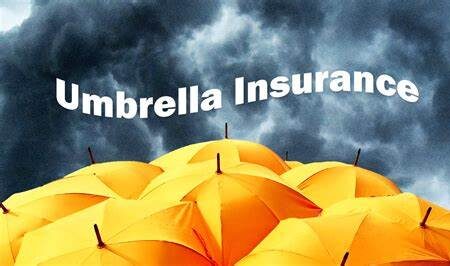Umbrella insurance is a type of liability insurance that provides extra protection beyond the limits of your standard homeowners or auto insurance policies. It’s a safety net designed to protect your assets and cover significant financial risks, especially in cases of costly lawsuits or claims. Understanding how umbrella insurance works and whether you need it is crucial for ensuring complete peace of mind and protecting your financial future.
Table of Contents
ToggleWhat is Umbrella Insurance?
At its core, umbrella insurance is additional liability coverage that extends beyond the limits of your standard insurance policies, such as homeowners, auto, or boat insurance. It’s designed to protect you in scenarios where you are found legally liable for damages or injuries, and your primary insurance policy cannot cover the full amount.
Key Features of Umbrella Insurance
- Excess Liability Coverage: Provides extra liability protection when the limits of your primary policy are exhausted.
- Wider Coverage: Covers claims not typically included in standard policies, such as libel, slander, or false imprisonment.
- High Coverage Limits: Policies usually start at $1 million and can go up to $10 million or more.
The idea behind umbrella insurance is to give you an additional financial buffer, safeguarding your assets in case of unexpected legal and financial challenges.
How Does Umbrella Insurance Work?
When a liability claim exceeds the coverage of your homeowners or auto insurance, your umbrella policy kicks in. Here’s how it works:
Example Scenario
Imagine you are at fault for a major car accident, and the injured party sues you for $1.5 million. If your auto insurance has a liability limit of $500,000, it will cover only up to that amount. The remaining $1 million would be your responsibility, which is where umbrella insurance comes into play. It would cover the excess $1 million, saving your personal assets from being seized or liquidated.
Umbrella insurance doesn’t just apply to incidents at your home or involving your vehicle; it can also cover accidents or liabilities anywhere in the world.
What Does Umbrella Insurance Cover?
Umbrella insurance provides coverage for various liability claims, including but not limited to:
H1: Bodily Injury Liability
This covers the cost of medical expenses and lawsuits resulting from injuries to another person. Examples include:
- Injuries to a guest who trips and falls on your property.
- Injuries resulting from a car accident where you were at fault.
- Harm caused by your pet, such as a dog bite.
Bodily injury claims can be costly, especially if they result in long-term medical care or disability for the injured party.
Property Damage Liability
This covers the cost of damage you cause to someone else’s property. Examples include:
- Damaging another person’s car in an accident where you were at fault.
- Causing significant damage to a neighbor’s property, such as a fire or water leak from your home affecting their home.
Property damage liability can extend to physical damage caused accidentally by you or a family member.
Personal Liability
Umbrella insurance often covers liability claims that aren’t included in standard policies. Examples include:
- Defamation: Being sued for slander or libel.
- Wrongful Eviction: If a tenant sues you for wrongful eviction.
- False Arrest or Imprisonment: If you are accused of detaining someone without proper cause.
These types of claims can be unpredictable but carry the potential for costly legal battles and settlements.
Legal Defense Costs
One of the significant advantages of umbrella insurance is that it also covers the legal fees and costs associated with defending yourself in court, which can add up quickly even if you’re found not liable in the end.
- Attorney Fees: Coverage for attorney fees and court costs.
- Settlement Costs: Protection from settlement amounts that could otherwise deplete your assets.
Legal defense coverage ensures that you have the financial support needed to fight lawsuits or claims effectively.
What is Not Covered by Umbrella Insurance?
While umbrella insurance offers broad protection, it doesn’t cover everything. Here are some exclusions:
- Your Own Injuries: Medical expenses or personal losses are not covered.
- Intentional Damage or Harm: If you intentionally cause damage or harm, umbrella insurance won’t provide coverage.
- Business Liability: Claims related to a business you own or operate are not typically covered unless you have a separate business umbrella policy.
- Contracts and Written Agreements: Coverage generally does not apply to liability assumed under a contract, such as a business agreement.
Knowing what umbrella insurance doesn’t cover can help you understand its limitations and the need for additional policies if necessary.
Why Do You Need Umbrella Insurance?
Not everyone needs umbrella insurance, but it can be crucial for those with significant assets or high liability exposure. Here are some scenarios where having this extra layer of protection is beneficial:
You Have Substantial Assets
If you own a home, investment properties, or have a large savings account, umbrella insurance can protect these assets from being used to satisfy a legal judgment.
- Homeowners: A serious accident on your property could lead to a lawsuit, and your standard policy may not be enough to cover the damages.
- Investors: If you have rental properties, you are exposed to liability risks from tenants or visitors.
You Are at a Higher Risk for Lawsuits
Some people are more likely to face liability claims based on their lifestyle or activities, such as:
- Pet Owners: If your pet has a history of aggressive behavior, you could be at risk for dog bite claims.
- Public Figures: If you have a high profile in the community, you may be more susceptible to lawsuits for defamation or slander.
People who host frequent gatherings or have a swimming pool or trampoline on their property also face higher liability risks.
How Much Does Umbrella Insurance Cost?
One of the most attractive features of umbrella insurance is its affordability. The cost of a policy varies, but on average, you can expect to pay:
- $150-$300 annually for $1 million of coverage.
- An additional $75-$100 per year for each additional $1 million in coverage.
Given the potential financial protection it offers, umbrella insurance is a cost-effective way to shield your assets from large claims or lawsuits.
How to Buy Umbrella Insurance
If you think umbrella insurance is right for you, here are some steps to get started:
Assess Your Risk
Evaluate your assets and the potential risks you face. This will help you determine the coverage amount you need. A rule of thumb is to buy enough coverage to protect your net worth.
Choose a Reputable Insurance Provider
Look for an insurance company with a strong reputation and good customer service. You can often bundle your umbrella policy with your existing homeowners or auto insurance for a discount.
- Tip: Ask your insurance agent if there are any specific requirements, such as minimum liability limits on your other policies before qualifying for an umbrella policy.
Conclusion
Umbrella insurance is a crucial form of liability protection that can save you from financial disaster in the event of a large claim or lawsuit. It’s an excellent option for those with considerable assets or those who want extra peace of mind. For more details on umbrella insurance policies and coverage options, visit Insurance Information Institute.
By understanding the ins and outs of umbrella insurance, you can make an informed decision about whether it’s the right choice for you. Stay protected and secure your financial future!




